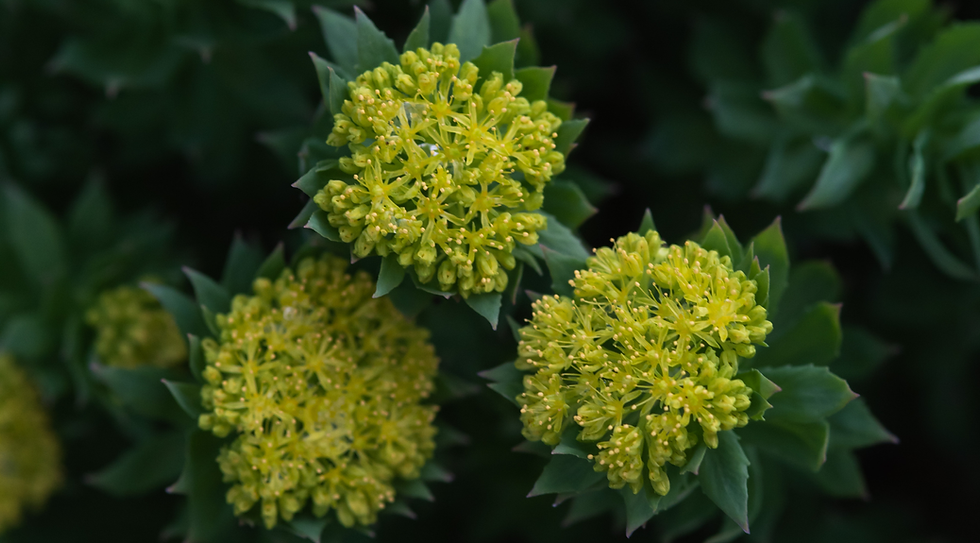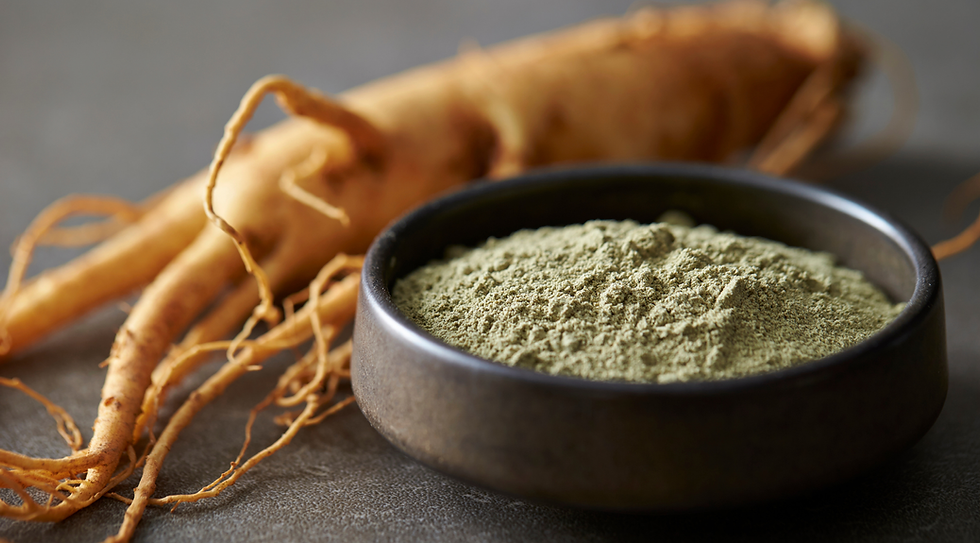The Role of Adaptogens in Modern Wellness Routines
- Zeynep Ozdemir
- Jul 1
- 7 min read
Adaptogens are natural substances that help the body adapt to stress and exert a normalizing effect upon bodily processes. With roots in Ayurvedic and traditional Chinese medicine, adaptogens are known for their unique ability to enhance the body's resilience to both physical and mental stressors without disrupting normal biological functions.
The use of adaptogens has deep cultural roots, stretching back centuries in Ayurvedic practices, where herbs like Ashwagandha were used to combat fatigue and anxiety. Similarly, Siberian and Scandinavian folk medicine prized Rhodiola Rosea for endurance in harsh climates. Modern scientific interest accelerated during the mid-20th century, particularly in the former Soviet Union, where researchers investigated these herbs for their potential to boost athletic and cognitive performance. Merging this legacy with current research, adaptogens have re-emerged as integral elements in many contemporary wellness routines. (1, 2)
Understanding Adaptogens and Their Benefits

What Are Adaptogens?
At their core, adaptogens are natural substances (primarily herbs and roots) that appear to bolster the body’s adaptive response to stressors. These stressors can range from everyday emotional strain to more pronounced physical challenges such as fatigue from strenuous exercise. (3, 4, 5)
Adaptogens are neither single-function stimulants nor sedatives; instead, they seem to work by regulating how the body and mind react to stress, potentially helping maintain equilibrium. Their increasing relevance stems from the fact that many people today face chronic stress, sleep disruption, and hectic schedules, all of which strain the body’s stress-response systems. (4, 6)
Why Use Adaptogens?
Given the accelerating pace of modern life, individuals often seek ways to boost cognitive performance, preserve energy, and protect themselves from the adverse effects of long-term stress. Adaptogens offer a natural, gentle alternative to pharmaceuticals, focusing on supporting foundational aspects of health rather than masking symptoms. They hold appeal for those who wish to optimize mental clarity, foster emotional stability, and maintain physical endurance without relying heavily on chemical stimulants or prescription medications. (7, 8)
Mechanisms of Action:
A key aspect of adaptogens lies in their interaction with the hypothalamic-pituitary-adrenal (HPA) axis, the body’s central stress-control system. Under normal conditions, the HPA axis helps regulate cortisol (a hormone released in response to stress) to keep internal processes like immune function, metabolism, and mood in balance. Chronic stress can keep cortisol levels elevated, leading to fatigue, reduced immunity, and brain fog. (9)
Adaptogens may help modulate this response, ensuring that cortisol release remains better aligned with actual stress demands. Additionally, some adaptogens are believed to influence inflammatory pathways, antioxidant defenses, and neurotransmitter production, further contributing to their broad-spectrum benefits. (9, 10)
Holistic Benefits:
While much of the research on adaptogens focuses on their stress-relieving properties, the positive effects often extend to other areas of health. By helping restore balance, adaptogens can improve sleep quality, support immune resilience, and may even aid metabolic processes such as blood sugar regulation. Many users report increased focus, calmer moods, and greater physical stamina. In essence, adaptogens aim to optimize how the body adapts to both daily pressures and occasional challenges, fostering a more robust overall vitality. (11)
Key Adaptogens in Focus
Ashwagandha
Ashwagandha is traditionally revered in Ayurvedic medicine for its stress-mitigating properties and potential to balance cortisol levels. It contains bioactive compounds called withanolides, which may help regulate the hypothalamic-pituitary-adrenal (HPA) axis, contributing to improved sleep quality, reduced anxiety, and enhanced energy. Studies suggest that consistent use of Ashwagandha can also support muscle strength and endurance, making it appealing for both mental and physical resilience. (12, 13)
Rhodiola Rosea:

Native to cold, mountainous regions, Rhodiola Rosea has long been used to combat fatigue and enhance stamina. Its main active constituents (rosavins and salidrosides) appear to influence neurotransmitters like serotonin and dopamine, potentially improving mood and cognitive function. Research indicates that Rhodiola can reduce mental fatigue and bolster memory under stress, making it popular among students and professionals seeking sustained focus. (14)
Ginseng:
Ginseng is best known for its ginsenosides, which contribute to its adaptogenic effects. It can help regulate blood sugar, support immune function, and may improve mental clarity. Studies show that ginseng modulates stress hormone release while supporting cognitive performance, making it a versatile option for those struggling with both physical and mental stressors. Its stimulating properties, however, require mindful use; especially for individuals sensitive to caffeine-like effects. (15)
Holy Basil (Tulsi):
Holy Basil, often called “Tulsi,” is praised for its antioxidant and anti-inflammatory actions. Traditional Ayurvedic texts consider it a “rasayana”, a rejuvenating herb. Compounds in Holy Basil seem to help stabilize cortisol and blood sugar levels, supporting emotional balance and metabolic health. This adaptogen is especially revered for promoting tranquility and aiding respiratory function, making it a favored choice among those seeking a calming effect without sedation. (16)
Schisandra:
Schisandra berries have been used in Traditional Chinese Medicine for centuries as a restorative tonic. Rich in lignans, they may help protect the liver from oxidative damage while enhancing mental clarity and focus. Schisandra is considered a “five-flavor fruit” in Chinese pharmacology and is believed to promote a balanced state across various organ systems. This multifunctional nature positions Schisandra as a potent adaptogen for overall well-being. (17)
Eleuthero (Siberian Ginseng):
Eleuthero, despite its moniker, is botanically distinct from Panax ginseng. Its adaptogenic constituents (eleutherosides) are researched for improving physical endurance and stress resilience. Historically, Soviet scientists studied Eleuthero for its potential to enhance athletic performance and speed recovery. By modulating stress hormones and supporting immune function, Eleuthero may serve those with active lifestyles or high mental demands. (18)
Integrating Adaptogens into Everyday Life

Starting Slowly: Introduce one adaptogen at a time to gauge individual responses. Adaptogens can be consumed as teas, tinctures, capsules, or powders mixed into smoothies. (19)
Timing: Some adaptogens like Ashwagandha may be more beneficial when taken in the evening to support restful sleep, while Rhodiola or Ginseng are often used in the morning to promote alertness. (20)
Combination Formulas: Many herbal companies offer adaptogenic blends that synergize different herbs. However, consulting a qualified healthcare provider ensures the blend suits specific health goals and avoids unwanted interactions. (21)
Synergistic Lifestyle Practices
Adaptogens tend to be more effective when paired with foundational wellness habits. Balanced nutrition) particularly ensuring adequate protein, essential fatty acids, and micronutrients (supports the body’s physiological processes. Regular physical activity boosts circulation and hormone balance, amplifying adaptogens’ stress-buffering effects. Mindfulness practices like meditation and yoga further stabilize the autonomic nervous system. This combined approach of nutritional awareness, exercise, and stress management often yields longer-lasting benefits than relying on adaptogens alone. (22)
Cautions and Considerations
Safety and Side EffectsAlthough adaptogens generally exhibit low toxicity, they can still interact with medications or exacerbate certain health conditions. Ginseng, for instance, may increase alertness, which can be problematic for individuals with insomnia or anxiety disorders. Rhodiola might interfere with certain antidepressants due to its influence on neurotransmitters. Individuals with chronic health issues, should consult a healthcare professional before using adaptogens. (23, 24)
Choosing the Right Adaptogens
Quality and Purity: Seek reputable brands that conduct third-party testing to confirm the identity and potency of their botanicals. (25)
Forms of Consumption: Adaptogens come in various forms; powder, capsule, tea, or tincture. The choice depends on personal preference, desired potency, and lifestyle convenience. (26)
Dosage Guidelines: Manufacturer recommendations and professional guidance can help determine suitable dosages. Starting at the lower end of the suggested range is prudent to minimize any potential side effects. (27, 28)
Bodhe's Recommended Supplement for Adaptogens in Modern Wellness Routines
UNWIND is a scientifically curated supplement designed to alleviate stress, enhance mood, and support deeper, more restorative sleep. It features potent adaptogens (such as Ashwagandha and Rhodiola Rosea) to regulate cortisol levels and bolster resilience against daily stressors, alongside L-Theanine and 5-HTP to balance key neurotransmitters like serotonin and dopamine. With Magnesium, GABA, and a complete Vitamin B Complex, UNWIND optimizes energy metabolism, fosters neurological health, and promotes relaxation, offering an all-in-one solution for mental calmness and overall well-being.
References:
Brekhman II, Dardymov IV. New substances of plant origin which increase nonspecific resistance. Annu Rev Pharmacol. 1969;9:419–430.
Panossian A, Wikman G. Effects of adaptogens on the central nervous system and the molecular mechanisms associated with their stress—protective activity. Pharmaceuticals (Basel). 2010;3(1):188–224.
Singh N, Bhalla M, Jager PD, Gilca M. An overview on Ashwagandha: a Rasayana (rejuvenator) of Ayurveda. Afr J Tradit Complement Altern Med. 2011;8(5 Suppl):208–213.
Chan YY, Hossein S, Poon E, et al. Adaptogens and stress: bridging the gap between traditional use and modern perspectives. J Ethnopharmacol. 2020;249:112381.
Li Y, Pham V, Bui M, et al. A systematic review of adaptogenic herbs: definition, drug interactions, and safety. Nutrients. 2017;9(5):334.
Winston D, Maimes S. Adaptogens: Herbs for Strength, Stamina, and Stress Relief. 2nd ed. Rochester (VT): Healing Arts Press; 2019.
Smith T, Wolf E, Topp R. Adaptogens in modern integrative health: evaluating synergy for chronic stress. Int J Complement Alt Med. 2021;10(3):114–122.
Chang D, Riva A. Efficacy of adaptogenic herbs in stress management: a systematic review. J Herbal Med. 2021;9:42–53.
Panossian A. Understanding adaptogenic activity: specificity of the pharmacological action of adaptogens and other phytochemicals. Ann NY Acad Sci. 2017;1401(1):49–64.
Patel S, Sharma V, Chauhan NS. Adaptogenic mediation of inflammatory pathways: a new direction for stress research. Inflammopharmacology. 2022;30(2):427–438.
Walker AF, Marakis G, Simpson E. Adaptogens and metabolic regulation: a pilot review of potential synergy. Phytother Res. 2020;34(9):2174–2183.
Lopresti AL, Drummond PD. The effects of ashwagandha (Withania somnifera) on stress, anxiety and cognitive function. J Psychopharmacol. 2019;33(9):1151–1171.
Chandrasekhar K, Kapoor J, Anishetty S. A prospective, randomized double-blind, placebo-controlled study of safety and efficacy of high-concentration Ashwagandha root extract in reducing stress and anxiety. Indian J Psychol Med. 2012;34(3):255–262.
Spasov AA, Wikman GK, Mandrikov VB, et al. A double-blind, placebo-controlled pilot study of the stimulating and adaptogenic effect of Rhodiola rosea SHR-5 extract on the fatigue of students. Phytomedicine. 2000;7(2):85–89.
Kim JH, Yi YS, Kim MY, Cho JY. Role of ginsenosides, the main active components of Panax ginseng, in inflammatory responses and diseases. J Ginseng Res. 2017;41(4):435–443.
Jamshidi N, Cohen MM. The clinical efficacy and safety of Tulsi (Holy Basil, Ocimum sanctum L.) in humans: a systematic review of the literature. Evid Based Complement Alternat Med. 2017;2017:9217567.
Panossian AG, Wikman GK. Pharmacology of Schisandra chinensis Bail.: an overview of Russian research and uses in medicine. J Ethnopharmacol. 2008;118(2):183–212.
Aslanyan G, Amroyan E, Gabrielyan E, et al. Double-blind, placebo-controlled, randomised study of single dose effects of ADAPT-232 on cognitive functions. Phytomedicine. 2010;17(7):494–499.
Rausch SM, Castro CM, et al. Integrative approach to adaptogenic therapy: recommendations for clinical practice. Complement Ther Med. 2021;58:102709.
Kolodziejczyk J, Saluk-Juszczak J. Circadian rhythm and the efficacy of adaptogens in shift workers. Chronobiol Int. 2019;36(10):1391–1402.
Beshara A, Tedd H, Winston D. Formulation of adaptogen blends: synergistic effects in botanical medicine. HerbalGram. 2022;133:50–63.
Hidayat M, Kusumastuti SL, Winardi J. Synergistic effect of adaptogens, nutrition, and exercise on stress regulation. Acta Sci Nutr Health. 2020;4(8):109–115.
Goré F, Raison CL. Safety profile of adaptogenic botanicals in mental health: a systematic review. Front Psychiatry. 2021;12:648267.
Nieman DC. Adaptogens, immune function, and upper respiratory tract infections. Curr Sports Med Rep. 2021;20(7): 399–405.
Brown AC, Matthews HL, Lall RK. Adulteration of herbal supplements: Quality control and the potential for improved consumer confidence. J Diet Suppl. 2020;17(2):219–232.
Cheng B, Crispim M, Simon JE. Comparing the efficacy of adaptogen teas versus capsules in stress management. J Herb Med. 2022;32:100568.
Wilson NS, Heimbach JT. Dosage considerations and risk assessment for adaptogenic botanicals. Regul Toxicol Pharmacol. 2021;121:104879.
Kwek J, Boon HS, Barton R. Clinical guidelines for adaptogen dosage in adult populations. Pharmacogn Mag. 2019;15(62):219–225.



Comments